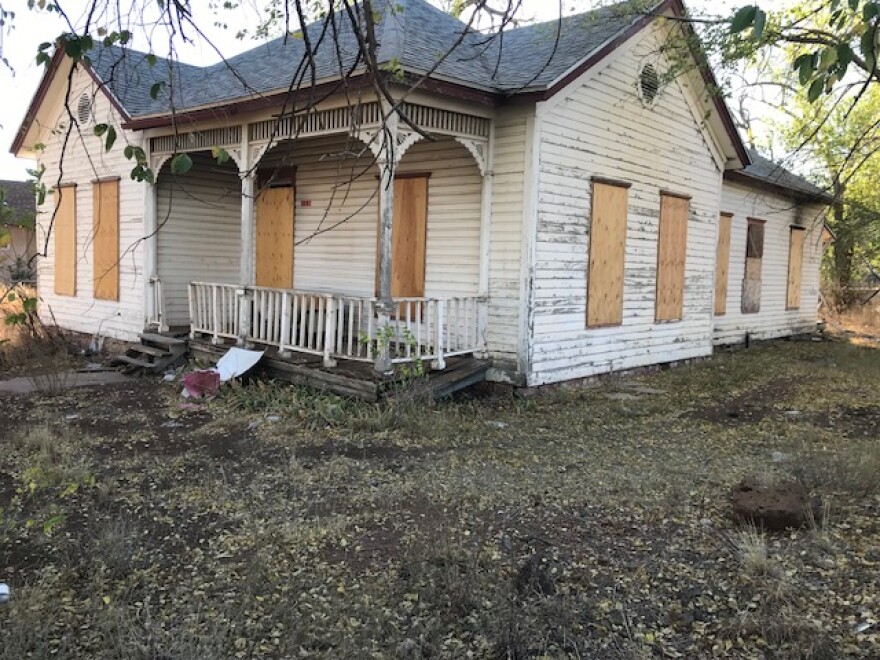KNAU checks in with Nephi Craig, a White Mountain Apache Chef, who gives new life to the food his ancestors cooked. KNAU’s Aaron Granillo reports Craig now uses indigenous food as a form of medicine to help fellow Apaches overcome addiction.
It’s been a little over a year since we last checked in with Nephi Craig, a White Mountain Apache Chef, who gives new life to the food his ancestors cooked. In our first report, Craig was head chef at the Sunrise Park Resort, putting his modern spin on native ingredients.

“Some grilled summer squash. We’re just going to grill off some zucchini, and then we’ll serve that with a little bit of apache acorn powder. Cedar roasted salmon. And then a pastry crust with pinyons, and we’re going to make some real, strong Apache coffee,” Craig said.
Now, Craig uses indigenous food as a form of medicine. I recently caught up with him to see how he’s helping fellow Apaches overcome addiction.
We’re in his pickup truck driving along the main highway in Whiteriver on the White Mountain Apache Reservation. He understands what his hometown must look like to an outsider like me; dilapidated homes, stray dogs, bags of trash on the sidewalk. It’s what Craig grew up with.
“To me, this is my neighborhood. This is what I love, and I’m struggling to put it into words for someone who’s not from here right now without making excuses or without being insensitive to this reality because this reality is very oppressive,” says Craig.

Craig calls Whiteriver “ground zero” for colonialism. Like many native tribes, he says the White Mountain Apache are caught up in a cultural battle, one where his people struggle to hold onto ancient tradition, while they exist in modern America.
“Just the fact that I speak English is colonialism in reality,” says Craig. “I can’t completely articulate what’s in my mind and heart in my own indigenous tongue. And, all my life that’s been a source of frustration, and embarrassment and shame.”
Alcohol and drugs helped him numb that pain for more than a decade. He finally got sober six years ago, and Craig is not alone. Every year, more than 800 Apaches come to Whiteriver to get clean at the Rainbow Treatment Center. Unlike traditional rehab facilities, indigenous food is one of the main tools for healing. Craig leads the center’s Nutritional Recovery Program.
“Good morning everyone,” Craig says. “How is everyone? Bright eyed and bushy tailed.”

We’ve pulled up at a local farm, called Ndée Bikíyaa, The People's Farm. It’s where the day starts for people in the program.
“The reason that we come to the farm is to connect you with seeds and plants and give you a basic understanding of how foods grow and why we grow it because there’s recovery messages in all of that.” Craig says.
He says the farm creates opportunities to plant seeds of sobriety. That’s something Clayton Harvey knows well. He’s been sober about three years.
“Farming saved my life. By being here, I’ve been able to reconnect with who I am as an Apache through the land,” Harvey says. “The land has, you know, healed me. The land has brought me to where I need to be in life, bringing that relationship back with mother earth.”

Now, Harvey is the greenhouse manager at the People’s Farm. He tells today’s group reconnecting with the land can help them too.
“They say that food was the center of Apache life,” Craig says. “At this farm, we hope to bring that culture back into the community, and leaving that alcohol, that drunk portion aside.”
That message resonates with Sarah, not her real name. She’s been in the program for about two months.
“I can be clean, and regrow my inner self and a better me,” says Sarah.
Sarah is 25. She’s spent her entire adult life addicted to meth. Now, she wants to get sober so she can be a better mother to her four children.
“I feel that the old me is fading away, and I like it,” says Sarah. “I plan to do more of this gardening thing with my kids. Kids always talk about watermelon, so I want them to try watermelon.”
Sarah says it’s not easy to raise kids on this reservation. High unemployment, poverty, and a lack of basic resources can create a culture of dependency. Chef Nephi Craig says that’s where a healthy, indigenous diet can empower.

“For indigenous people in recovery, connecting with our foods system and our indigenous foods is key because there’s a really deep spiritual connection with food,” says Craig. “So, if a community’s going to recover, their food system also has to recover as well.”
It’s a few hours later, and Craig sets up a makeshift kitchen inside an old, boarded-up gas station down the road. It’s under renovation to become a self-sustaining, native-run restaurant called Café Gozhóó. The Apache word means love, harmony, and respect.
“Café Gozhóó is a response to historical trauma,” says Craig. “It’s a demonstration to our community that we’re circulating ancestral knowledge instead of exporting it.”

This space is also a training center for people in the recovery program.
“Cooking is all about common sense, just like getting sober is a lot of common sense,” Craig tells the group.
They listen and watch as Craig tosses a spinach salad with Apache seeds, tomatoes, and beets freshly picked from the People’s Farm, a living metaphor for the hard work it takes to get sober.
“You could that say when you come into treatment, right now you’re a depleted soil, right?" Craig says. "Lacking nutrients, spiritually bankrupt. Emotionally spent. You got to let it break down and you can grow those seeds of sobriety in, right?”
Craig tells them their ancestral food is part of the answer. It always has been.








